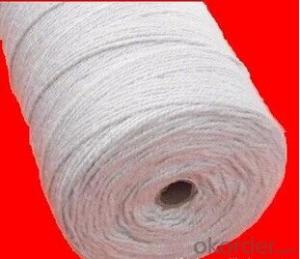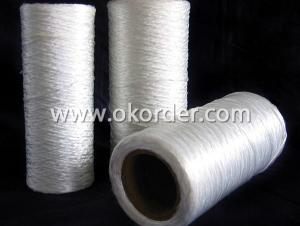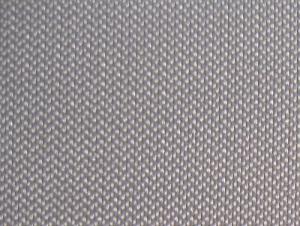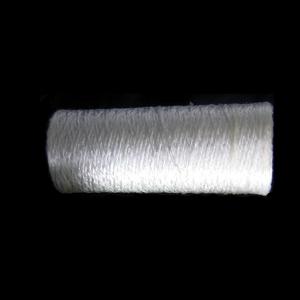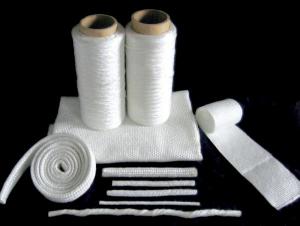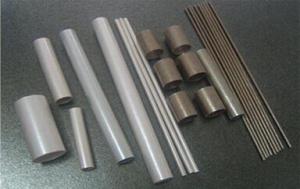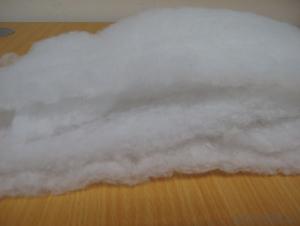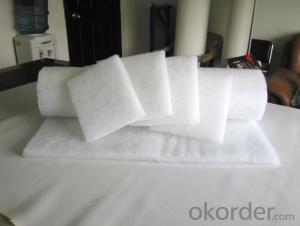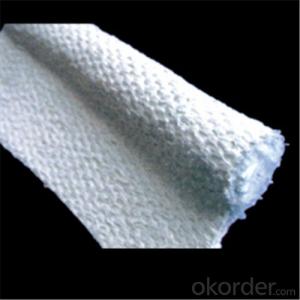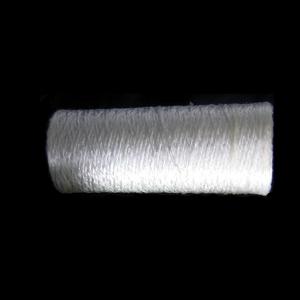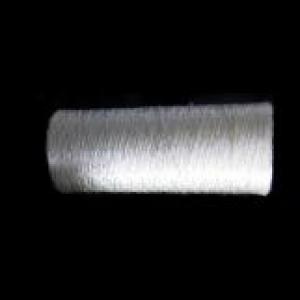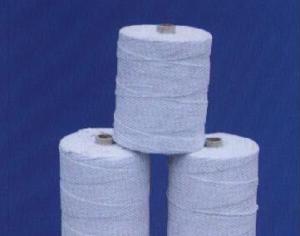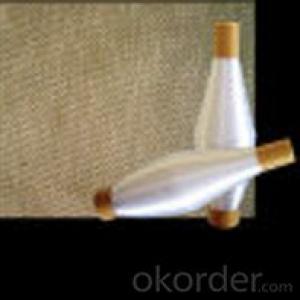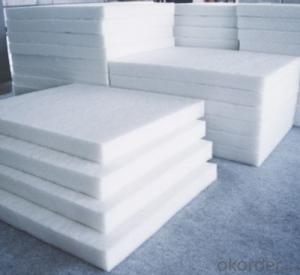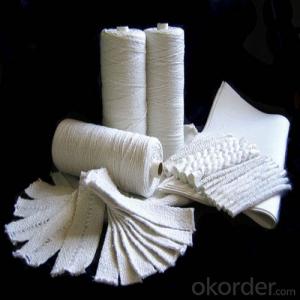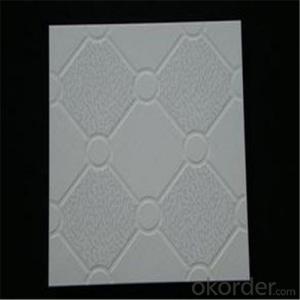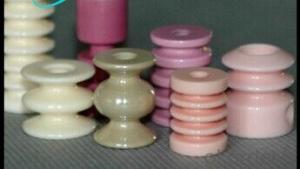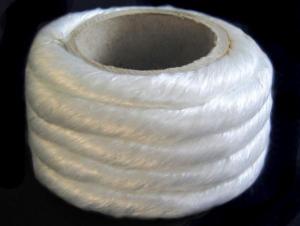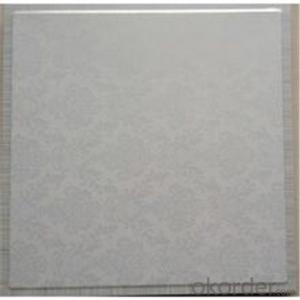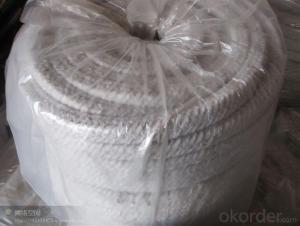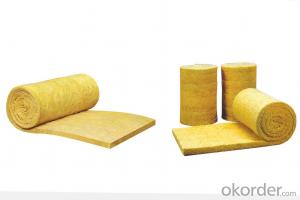Glass Fiber Textiles Thermal Insulation Ceramic Yarn Product
- Loading Port:
- Qingdao
- Payment Terms:
- TT OR LC
- Min Order Qty:
- 500 m
- Supply Capability:
- 2000 m/month
OKorder Service Pledge
OKorder Financial Service
You Might Also Like
Specifications
1. Ceramic fiber yarn.
2. Classfication Temp:1260C.
3. Low thermal conductivity.
Tech Data:
Colour | White | |||||
Al203+sio2% | >=97 | |||||
Fiber diameter(um) | 2-4 | |||||
Fiber Iength(mm) | 100-200 | |||||
Bulk density(Kg/m3) | 300-700 | |||||
Moisture % | <=1.0 | |||||
Thermal Conductivity(Hot face),w/m.k | 0.12~0.13(300°C) | |||||
Heating liner shringkage(%) | <=3.5(1000°C*3h) | |||||
High-temperature loss on lgnition | 10 | 15 | 20 | 15 | 20 | 25 |
Safe working temp°C | <=1000 | <=450 | ||||
Acid-resistance and alkali-resistance% | 50(10% NaoH After 72 hours) | |||||
Reinforced material | Stainless Steel | Glass filament | ||||
Application:
Ceramic fiber yarn used in producing ceramic fiber tape, ceramic fiber rope, ceramic fiber cloth and fabrics.
Used in high temperature sealing and insulation.
Hitex ceramic fiber yarn is made from alumina silica ceramic fiber, free of asbestos, can be used in different industrial applications under temperatures up to 2300 °F (1260 C) and has excellent chemical stability and strong resistance to thermal shock and corrosion attack. Exceptions are hydrofluoric and phosphoric acids and concentrated alkalis. It also resists oxidation and reduction,
- Q: Can glass fiber textiles be used in solar panels?
- Yes, glass fiber textiles can be used in solar panels. They are often used as reinforcement materials in the manufacturing of solar panels, providing mechanical strength and durability to the panel structure. Additionally, glass fiber textiles can help improve the overall performance and reliability of solar panels by reducing the risk of mechanical failure and extending their lifespan.
- Q: Can glass fiber textiles be knitted?
- Yes, glass fiber textiles can be knitted.
- Q: Can glass fiber textiles be used in reinforcement of concrete?
- Glass fiber textiles, also known as fiberglass, offer a valuable solution for enhancing the strength and durability of concrete. These materials, renowned for their lightweight and robust nature, can be integrated into concrete to bolster its tensile strength. Primarily, the textiles are woven into mats or sheets, which can be seamlessly incorporated into the concrete mix during construction. Once the concrete sets, the glass fiber textiles fortify the structure, effectively preventing cracking and impeding the spread of existing cracks. This technique finds widespread application in diverse construction projects, including bridges, buildings, and pavements. Moreover, the corrosion-resistant properties of glass fiber textiles render them particularly suitable for environments where concrete is exposed to harsh conditions like saltwater or chemical exposure. Ultimately, utilizing glass fiber textiles in concrete reinforcement not only enhances structural performance but also enhances the lifespan of concrete structures.
- Q: Can glass fiber textile be used in window treatments?
- Yes, glass fiber textile can be used in window treatments. It is a versatile material that offers durability, resistance to heat and UV rays, and is often used for creating blinds, curtains, and shades for windows.
- Q: What are the different types of glass fiber textiles?
- In various industries and applications, one can find numerous types of glass fiber textiles commonly used. Some of the most frequently encountered types are as follows: 1. Woven Roving: This particular glass fiber textile is produced by intertwining multiple strands of glass fibers in a crisscross manner. It is renowned for its exceptional strength and rigidity, which makes it ideal for applications requiring structural support, like boat and aircraft construction. 2. Fiberglass Cloth: A lightweight and flexible glass fiber textile commonly employed for insulation, reinforcement, and repair purposes. It finds extensive use in the construction industry for reinforcing concrete and in the automotive industry for repairing fiberglass components. 3. Chopped Strand Mat (CSM): Made by randomly dispersing short strands of glass fibers onto a continuous mat. It is widely used in the manufacturing of composite materials, such as fiberglass-reinforced plastics (FRP), owing to its remarkable strength and dimensional stability. 4. Non-woven Fabrics: These glass fiber textiles are created by bonding glass fibers together using heat, chemicals, or mechanical processes. They are frequently utilized for filtration, insulation, and soundproofing applications due to their high porosity and excellent thermal and acoustic properties. 5. Knitted Fabrics: These glass fiber textiles are formed by interlocking loops of glass fibers. They are recognized for their flexibility and stretchability, making them suitable for applications requiring a snug or adaptable material, such as protective clothing and sports equipment. Overall, the diverse range of glass fiber textiles offers distinct characteristics and properties, enabling their widespread use across various industries, including construction, automotive, aerospace, and manufacturing.
- Q: Can glass fiber textiles be printed on?
- Yes, glass fiber textiles can be printed on. The printing process involves applying ink or dye onto the surface of the textile to create desired patterns or designs. However, it is important to note that the printing technique used may vary depending on the specific characteristics of the glass fiber textile. For example, screen printing is commonly used for thicker and more rigid glass fiber textiles, while digital printing or heat transfer printing may be more suitable for thinner and more flexible textiles. Additionally, it is important to consider the type of ink or dye that is compatible with glass fiber textiles to ensure proper adhesion and durability of the printed design.
- Q: Can glass fiber textile be used in electronics?
- Yes, glass fiber textile can be used in electronics. Glass fiber textile, also known as fiberglass cloth, is a material made from fine fibers of glass. It has excellent properties such as high strength, heat resistance, and electrical insulation. These characteristics make it suitable for a variety of applications in the electronics industry. Glass fiber textile can be used as a substrate for printed circuit boards (PCBs), which are essential components of electronic devices. PCBs provide a platform for mounting and connecting various electronic components such as resistors, capacitors, and integrated circuits. The high strength of glass fiber textile ensures the structural integrity of the PCB, while its electrical insulation properties prevent short circuits and ensure reliable performance. Furthermore, glass fiber textile can be used as insulation material in electronic cables and wires. It provides excellent thermal and electrical insulation, protecting the conductive wires from external factors such as heat, moisture, and electromagnetic interference. This insulation helps maintain the signal integrity and prevents electrical hazards in electronic devices. Glass fiber textile is also utilized in the manufacturing of electronic enclosures and housings. It can be molded into various shapes and forms, providing a protective barrier for electronic components against physical damage, dust, and moisture. The heat resistance of glass fiber textile ensures that the enclosure can withstand high temperatures generated by electronic devices. Overall, glass fiber textile is a versatile material that finds extensive use in the electronics industry. Its high strength, heat resistance, and electrical insulation properties make it an ideal choice for applications such as PCBs, cable insulation, and electronic enclosures.
- Q: Can glass fiber textiles be used in the production of window blinds?
- Yes, glass fiber textiles can be used in the production of window blinds. Glass fiber textiles are known for their durability, strength, and resistance to heat and moisture. These properties make them suitable for use in window blinds, as they can withstand the elements and maintain their shape and integrity over time. Additionally, glass fiber textiles can provide insulation and UV protection, which can be beneficial for window blinds. The use of glass fiber textiles in window blinds can also offer enhanced privacy and light control. Overall, glass fiber textiles are a viable option for the production of window blinds due to their numerous advantageous properties.
- Q: How does glass fiber textile perform in terms of colorfastness?
- Glass fiber textile is known for its excellent colorfastness properties. It does not fade or lose its color easily, even when exposed to sunlight or harsh environmental conditions. This makes it a reliable choice for products that require long-lasting vibrant colors.
- Q: Are glass fiber textiles resistant to solvents or cleaning agents?
- Glass fiber textiles, in general, display resistance to solvents and cleaning agents. The remarkable attributes of glass fiber, including its high tensile strength and durability, contribute to its ability to withstand a wide array of chemicals. Industries like automotive, aerospace, and chemical processing commonly employ glass fiber textiles due to the frequent exposure to solvents and cleaning agents. Nevertheless, it is crucial to acknowledge that the level of resistance to solvents and cleaning agents may vary depending on the specific type of glass fiber and the composition of the solvent or cleaning agent. Therefore, it is always recommended to consult the manufacturer's specifications or perform a compatibility test before subjecting glass fiber textiles to a particular solvent or cleaning agent.
Send your message to us
Glass Fiber Textiles Thermal Insulation Ceramic Yarn Product
- Loading Port:
- Qingdao
- Payment Terms:
- TT OR LC
- Min Order Qty:
- 500 m
- Supply Capability:
- 2000 m/month
OKorder Service Pledge
OKorder Financial Service
Similar products
Hot products
Hot Searches
Related keywords
